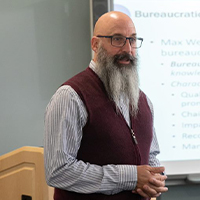Outcomes
Upon completion of the Healthcare Administration skilled pathway, graduates will be able to:
- Successfully navigate through the increasing complexity of healthcare systems
- Synthesize knowledge and skills to plan a strategic transformation of a simulated healthcare system
- Comprehend Health and Data Analytics
FAQs
DO I REALLY NEED A DEGREE TO WORK IN HEALTHCARE ADMINISTRATION?
Almost all entry-level healthcare administration jobs require a bachelor’s and having educational training in Healthcare Administration specifically provides a massive advantage in earning potential and salary. People with a bachelor’s degree also have a 50% lower rate of unemployment, and on average, they make an additional $630,000 to $900,000 over their lifetime, even more in high-growth fields like this one.
WAS THIS PROGRAM REALLY CREATED WITH CORPORATE PARTNERS?
Yes! The only way to make sure our program gives you the skills you need to get hired and teaches you to work through real-world problems is to partner with the people out there who are actually doing it. Our collaboration with Fortune 500 companies and subject matter experts means that their multi-billion-dollar expertise is reflected in everything you’ll study here.
WHAT WILL MY CAREER LOOK LIKE?
Healthcare Administration is huge, and you can use the coveted skills from this program to secure many different kinds of high-growth employment. If the idea of helping facilitate a process that serves a large number of patients appeals to you, you may want to work as a hospital administrator. If you want a smaller scale and more personalized workplace, you may point towards being a nursing home or private practice administrator. In this field, the possibilities available to you are essentially endless.
WHAT IS A FLIPPED CLASSROOM?
A flipped classroom is one where the focus is not on lectures but on discussion, projects, and problem-solving. Students in flipped classrooms get the chance for more instructor feedback and, as a result, have been found to learn much, much faster.
HOW DO I KNOW IF I’M INTERESTED IN THIS PROGRAM?
If you are interested in developing your leadership skills, if you have a passion for helping people live healthy and fulfilling lives, if you are looking for a degree that opens a ton of doors to different high-growth careers, if you want to have a job that never gets boring, and if you want to gain a skill set that makes you more and more valuable as your career progresses, you should consider this field.
WHAT DOES OPTIONAL SYNCHRONOUS MEAN?
Flexibility. Optional Synchronous means our Healthcare Administration courses can be attended together at one time with other students or on your own schedule. Many students prefer the learning that comes with live interactions, while other students love the flexibility of doing their courses whenever it fits into their schedule.
WHO WILL BE IN MY CLASS?
The courses in this program are part of an exclusive partnership between ENC and Rize Education, which means you’ll be learning with students from your campus, as well as students from a selective consortium of schools across the country. That means you get to enjoy the small Christian college environment while also building a national network of people in your industry before you’ve even graduated.
About Rize Partnership Programs
We are offering these high demand, skills-focused programs through an innovative nationwide consortium of over 75 colleges and universities much like ENC. As a student in these programs, you enjoy the opportunity to attend a small Christian college while developing specialized skills that will prepare you for careers in some of today’s fastest-growing fields. In your major and your general education coursework, you will have the opportunity to develop a strong Christian worldview while the courses in the RIZE partnership programs will supplement that work by exposing you to industry experts who will teach you and students at other consortium institutions virtually. We refer to these programs as skilled pathways because they emphasize the in-demand skill-sets that employers are saying they need. Students who complete all of the courses in a particular program will have their completion of the courses recorded as a minor on their transcript upon graduation, but many of the individual courses and programs offer opportunities to complete industry certifications or prepare you to complete certification exams that can also be valuable additions to a resume.

